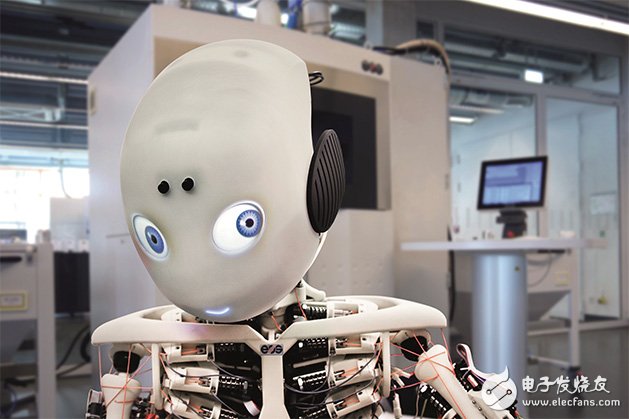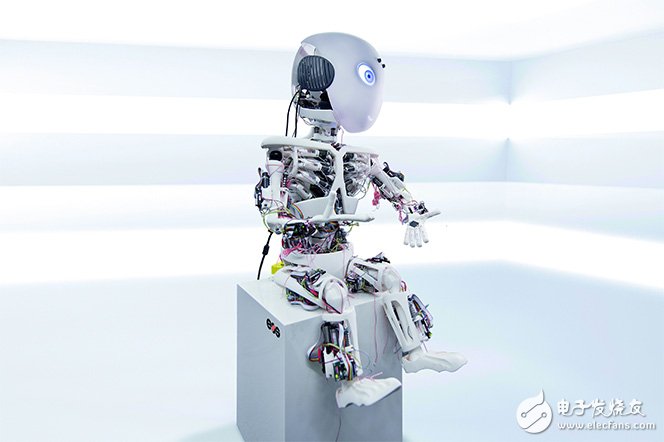Clarin, Germany, February 15, 2017 – EOS, the global leader in technology and quality for high-end additive manufacturing (AM) solutions, announced that it will support the Swiss Devanthro Society and the Roboy project at the Technical University of Munich. The project aims to improve humanoid robotics and continuously optimize the Roboy model until its performance is comparable to the real agility, robustness and flexibility of the human body.

Figure 1: EOS announces support for the Roboy project to improve humanoid robotics (Source: EOS and Swiss Devanthro Society; filming: Adrian Baer)
The first prototype, "Roboy's first generation," has replaced the motor that was previously placed at the joint with muscles and tendons. The achievement of this achievement is inseparable from the extensive use of additive manufacturing technology – the skeletal structure of the entire Roboy model, including bones and muscles, is made from EOS's plastic additive manufacturing machine. There are several key advantages to using industrial 3D printing, including the ability to implement complex functional geometries and to keep the hardware continually iterative.
Value of additive manufacturingAdditive manufacturing makes it possible to construct highly complex and extremely lightweight and stable structures. It enables a high degree of design freedom, optimization and functional integration, and small-scale production at a lower unit cost. Roboy's R&D benefits from these advantages: breaking through traditional manufacturing process constraints and building complex functional geometries allows the Roboy team to implement some of the functions directly on the geometry. Correspondingly, the complexity of creating this model is reduced, and some of the original assembly steps are eliminated. For example, Roboy's hands and forearms are designed in one piece, including the joints and the phalanx of each finger.
Since Roboy needs to achieve maximum mechatronics in a minimum of space, some projects are not required to be verified during the simulation. Therefore, the R&D team needs to test the robots that are designed and shaped. The key to additive manufacturing technology is thus reflected – with additive manufacturing technology, teams can quickly create individual components and modularize and parameterize robot construction to continually optimize hardware development and iteration.
Rafael Hostettler, head of the Roboy project, said: "In the software development process, performance can be tested in real time in every development cycle, so that software can be continuously optimized. Additive manufacturing allows us to apply this method. Robot technology quickly finds the best features in a short period of time.†He said: “EOS's additive technology helps us to iterate on hardware development, which is especially critical for our projects.â€
Humanoid robot: a vision of social impact
Figure 2: Roboy: When the robot meets 3D printing (Source: EOS and Swiss Devanthro Society; Shooting: Adrian Baer)
In the future, with the continuous development of artificial intelligence and robotics, robots will play an increasingly important role in society and work, until the most dangerous and repetitive work will be done by robots. Therefore, compared with traditional robots, robots that are similar to human morphological features will have obvious advantages. First, it has been proven that mimicking the human skeletal muscle system creates an agile, flexible and robust robot. In addition, humanoid robots make the interaction between people and machines extremely easy and more intuitive and natural. For centuries, people have struggled to adapt the environment to their needs, and humanoid robots have been better integrated into the environment, reducing the cost of adaptation. In addition, creating robots that are compatible with the human body structure will also help to enhance or repair human activity using exoskeletons and prosthetics.
Dr. Adrian Keppler, Chief Marketing Officer of EOS, said: “When a large number of companies focus on the development of artificial intelligence, only a small number of projects around the world focus on the development of humanoid robots. Therefore, it can support the famous Roboy project and witness the major project. We are very proud of the significance. The advantage of additive manufacturing lies in breaking through the limitations of traditional manufacturing methods. EOS technology is the best choice to support Rboy's R&D projects with great ideals. We are very happy that the Roboy team is on the way to achieve the ideal. Choose to work with EOS."
About EOSFounded in 1989, EOS is a global technology leader in 3D printing for the metal and polymer materials industry. As an independently operated company, EOS provides a comprehensive additive manufacturing solution as a pioneer and innovator. Everything EOS does is based on corporate responsibility and sustainability principles, while taking care of the company's internal and external commitments to meet customer needs.
Unlike other companies, EOS has successfully achieved the perfect blend of powder materials and laser sintering. In addition, EOS's solution portfolio includes all the key elements involved in industrial 3D printing, where systems, materials and process parameters are intelligently coordinated to ensure reliable, high-quality components and drive a decisive Competitive advantage. In addition, customers benefit from EOS' deep and professional global service, application engineering and consulting services.
EOS has nurtured a vibrant ecosystem of partners and helped venture companies with promising prospects through venture capital projects. This organic integration with the entire industry value chain makes more comprehensive 3D printing possible, driving the digitalization and automation of manufacturing.
Plug-in Piece Sensor
Feyvan Electronics designs and manufactures NTC temperature sensors, probes, and cable assemblies with excellent long-term stability, high accuracy and short response time in high-temperature sensing applications such as automotive, home appliance and industrial use from -40℃ to +250℃.
With more than 15 years of NTC thermistors and sensor probes production experiences, Feyvan electronics provide various choices for a wide range of applications and are available in custom engineered probe package configurations for a variety of mounting and connectivity options with low costs.
Plug in Sensor,Sensor Coffee Maker,Sensor Coffee Machines,Automotive Sensors
Feyvan Electronics Technology Co., Ltd. , https://www.fv-cable-assembly.com